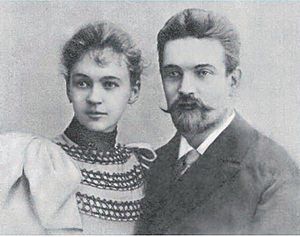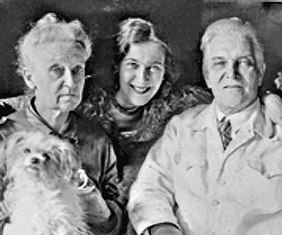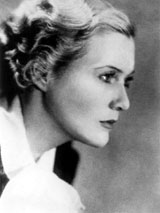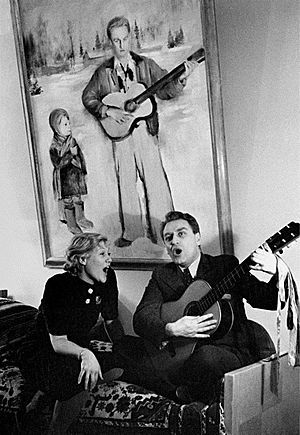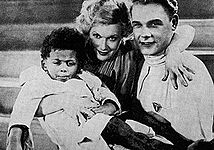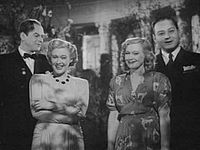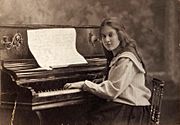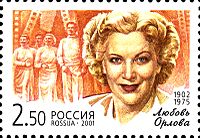Lyubov Orlova facts for kids
Quick facts for kids
Lyubov Orlova
|
|
|---|---|
| Любовь Орлова | |
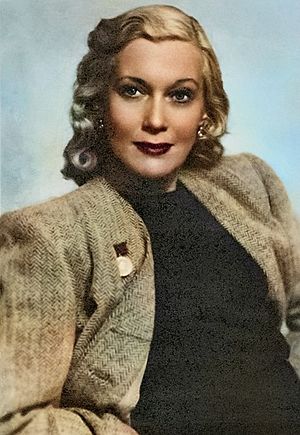
Lyubov Orlova playing a famous female scientist in Springtime, 1947
|
|
| Born |
Lyubov Petrovna Orlova
11 February 1902 Zvenigorod, Moscow Governorate, Russian Empire
|
| Died | 26 January 1975 (aged 74) Moscow, Russian SFSR, USSR
|
| Resting place | Novodevichy Cemetery, Moscow |
| Alma mater | Moscow Conservatory |
| Occupation | Actress, pianist, singer, dancer |
| Years active | 1926–1974 |
| Spouse(s) |
|
| Awards |
|
Lyubov Petrovna Orlova (Russian: Любовь Петровна Орлова [lʲʊˈbofʲ pʲɪˈtrovnə ɐrˈɫovə]; 11 February [O.S. 29 January] 1902 – 26 January 1975) was a Soviet and Russian actress, singer, dancer and People's Artist of the USSR (1950).
Contents
Life and career
She was born to a family of Russian hereditary nobles, her maternal side, and gentry, her paternal side. in Zvenigorod, 60 km from Moscow, then lived with her parents and older sister in Yaroslavl. Her acting and singing talents were evident very early on, but her noble parents considered acting a disgraceful career and directed her towards classical music. There she began to study music. In 1914, after her father left for the front, her mother Evgenia Nikolaevna and her daughters settled in Moscow, where the sisters entered the gymnasium. The Orlovs spent the difficult years of the Civil War in Voskresensk because their mother's sister lived here. The family subsisted on funds from the sale of milk which was given by the aunt's cow. Lyuba and Nonna drove nearly a hundred kilometers to Moscow, and then went home, with heavy cans. Hence comes the legend of the ugly hands which Orlova was so shy about. Her first and last names are meaningful words in Russian: любовь means "love", and Орлова is the feminine form of орлов "eagle's".
When she was seven, Fyodor Shalyapin predicted her future as a famous actress. In 1919–1922, she studied as a piano student at the Moscow Conservatory (Professor K. Kipp class) but did not graduate because she had to work as a music teacher and a pianist-illustrator of silent films in movie theaters (French: tapeur) to support her parents. In 1925, she has graduated from the Moscow Theatre College, choreography department. Her first husband, a Soviet economist, Andrei Berzin, was arrested in 1930. However, this did not affect her career. Dmitri Shcheglov, a biography author, wrote in Love and Mask ('Lyubov i maska', 1997): "As an eternal irony and foresight of fate, the best performer of the roles of house servants and enthusiasts of Communist labor was a descendant of ten Russian Orthodox saints. Two of them, Olga, the Grand Princess of Kiev, and Vladimir, the Grand Prince of Kiev, are among the Equal-to-apostles... Red Eagle in an azure-golden field, the House of Orlov's coat of arms, is also present on the Bezhetsk clan branch the actress belonged to..." The Orlov family was partly saved from the worst form of repression, camps or deportation, and the Bolshevik "redistribution of property" only because even before the Revolution, her father Peter had lost all three of his estates at cards, and therefore there was practically nothing to take away. However, Orlova's father, an engineer and class enemy, was officially banned as an employee.
In September 1926, she was hired as a choir singer by the Nemirovich-Danchenko Theatre Music Studio finally deciding to become an actress, not a pianist. She received her first solo role in November, the same year. Her quick promotion was fueled by Olga Baclanova's sudden departure from Russia and Vladimir Nemirovich-Danchenko's eye for this type of female beauty. In 1932, she received her first leading roles in La Périchole and Les cloches de Corneville. Despite her success with the public, vocal and acting training in a theatre with Ksenia Kolubai, Orlova wasn't noticed by the press and was criticized by her colleagues for not having a real singing voice. However, Orlova had her "trick". Remembering her student years (and she studied at the choreography department of the Moscow Theater College named after A.V. Lunacharsky, now - GITIS), she decided to bring herself back to her previous form and perform Serpoletta's entrance aria on pointe. Alexander Hort, writer, wrote: "The audience was smitten: while dancing, Serpoletta stood up on pointe shoes, so graceful, airy, romantic! And Orlova made a tactically verified move, she took the bull by the horns: the very first vocal number, Serpoletta's verses 'What a pity that an unsettling case pushed me to a different path!' she performed, dancing on her fingers." In the future, no one was able to repeat this trick, it has stayed as a semi-legendary fact of history.
In 1933 she met the novice director Grigory Alexandrov, who was casting actors for his movie Jolly Fellows (1934), and married him. Orlova's performance in this comedy, very popular in the USSR, earned the young star the sympathy of Stalin and the title "Honorable actor of the RSFSR". It had caused the first wave of the so-called "Orlova syndrome", a Soviet psychiatric term describing women who wanted to be like Orlova. They diligently lightened their hair and self-styled themselves as relatives to the idol. According to her relatives, Orlova secretly loathed Joseph Stalin reacted to death with the words: "Finally, this scum is dead". Her critics, including Sergei Eisenstein, had blamed the musician-turned-actress for ruining the serious career of Alexandrov. Despite her efforts, Orlova didn't have a reputation of a serious drama actress, moreover, she was intentionally overplaying her film roles and didn't stop her constant touring as a singer. Her haters credited her success to the marriage of convenience and Stalin protection
In the next few years she starred in four popular movies which also became instant Soviet classics: Circus (1936), Volga-Volga (1938), Tanya (1940), and Springtime (1947). She was awarded the Stalin Prize in 1941. In 1950, she became the first woman to receive the title of the People's Artist of the USSR exclusively for her cinematic works. After that, she switched to playing in theatre productions of Yuri Zavadsky's company. Her most famous roles included Nora - Nora, Dear Liar - Patrick Campbell, Strange Mrs. Savage - Mrs. Ethel Savage.
Since the 1928 till her death, she was constantly touring as a singer with her pianist Leo Mironov (Russian: Лев Миронов, romanized: Lev Mironov). Her early repertoire included classical songs by Glinka, Mussorgsky, Dargomyzhsky and Tchaikovsky. During the war, she toured more than 50,000 kilometers along the front line, with her concerts based on Isaak Dunayevsky songs from her movies. For all of her career, she was banned from making the records of her songs and performing on television, supposedly because of her "backstage war" with Klavdiya Shulzhenko, Leonid Utesov's choice of interest for Jolly Fellows. Ivan Kozlovsky especially regretted the absence of recordings of his own duets with Orlova.
Personal life
In 1926 or, according to her grandniece Nonna Golikova, in 1921, Lyubov Orlova married a Soviet economist Andrei Berzin (1893-1951), the deputy head of the administrative and financial department for the People's Commissariat of Agriculture. Orlova didn't love her husband. They got divorced by 1931.
In January 1934, or, according to a different archive source, in 1937, Orlova married a renowed film director Grigori Aleksandrov. In June 1941, Orlova has adopted his son Douglas (renamed Vasili), from his marriage to actress Olga Ivanova. She never had children of her own.
Death
Orlova died on January 26, 1975, in Moscow, Russia, of pancreatic cancer. She was buried at the Novodevichy Cemetery in Moscow, Russia.
Awards and honours
 Honored Artist of the RSFSR (1935)
Honored Artist of the RSFSR (1935) People's Artist of the RSFSR (5.11.1947)
People's Artist of the RSFSR (5.11.1947) People's Artist of the USSR (6.03.1950)
People's Artist of the USSR (6.03.1950) USSR State Prize, first class
USSR State Prize, first class
- 1941 — for the role 'Marion Dixon' in the film Circus (1936) and the role 'Arrow' in the film Volga-Volga (1938)
- 1950 — for the role 'an American journalist Jeannette Sherwood' in the film Encounter at the Elbe (1949)
 Order of Lenin (1.02.1939)
Order of Lenin (1.02.1939) Orders of the Red Banner of Labour (1.04.1938, 4.11.1967)
Orders of the Red Banner of Labour (1.04.1938, 4.11.1967) Medal "For the Defence of the Caucasus" (1944)
Medal "For the Defence of the Caucasus" (1944) Medal "For Valiant Labour in the Great Patriotic War 1941–1945" (1945)
Medal "For Valiant Labour in the Great Patriotic War 1941–1945" (1945) Medal "In Commemoration of the 800th Anniversary of Moscow" (1947)
Medal "In Commemoration of the 800th Anniversary of Moscow" (1947) Medal "For the Development of Virgin Lands"
Medal "For the Development of Virgin Lands" For Valiant Labour – Jubilee Medal "In Commemoration of the 100th Anniversary of the Birth of Vladimir Ilyich Lenin" (1970)
For Valiant Labour – Jubilee Medal "In Commemoration of the 100th Anniversary of the Birth of Vladimir Ilyich Lenin" (1970)- Anniversary badge "XX Years of Soviet Cinematography" (1940)
- VIII Venice Film Festival (1947, Special Prize for the best female role in Springtime (shared with Ingrid Bergman).
- IV International Film Festival in Mariánské Lázně (1949, Peace Prize for the film Encounter at the Elbe)
- Certificate of honor from the Soviet Peace Committee (1960)
Filmography
| Year | Title | Original Title | Role | Notes |
|---|---|---|---|---|
| 1933 | Alëna's Love | Любовь Алёны | Mrs Ellen Getwood, the wife of American engineer | silent film, lost |
| 1934 | A Petersburg Night | Петербургская ночь | Grushen’ka | music by Dmitry Kabalevsky |
| 1934 | Jolly Fellows | Весёлые ребята | Anyuta | music by Isaac Dunayevsky |
| 1936 | Circus | Цирк | Marion Dixon | music by Isaac Dunayevsky |
| 1938 | Volga-Volga | Волга-Волга | letter carrier Dunya Petrova ("Strelka") | music by Isaac Dunayevsky |
| 1939 | Engineer Kochin's Error | Ошибка инженера Кочина | Ksenia Lebedeva, employee of the Aviation Institute | |
| 1940 | Tanya | Светлый путь | Tanya Morozova "Cinderella" | music by Isaac Dunayevsky |
| 1941 | Fighting Film Collection #4 | Боевой киносборник № 4 | letter carrier Dunya Petrova ("Strelka"), presenter of the collection | |
| 1941 | The Artamonov Business | Дело Артамоновых | dancer Paula Menotti | cameo |
| 1943 | A Family | Одна семья | Katya | film wasn't released in theatres |
| 1943 | People of the Caspian | Каспийцы | documentary by Grigori Alexandrov | |
| 1947 | Springtime | Весна | actress Vera Shatrova / scientist Irina Nikitina | music by Isaac Dunayevsky |
| 1949 | Encounter at the Elbe | Встреча на Эльбе | Jeannette Sherwood, journalist | music by Dmitry Shostakovich |
| 1950 | Mussorgsky | Мусоргский | Yuliya Platonova, opera singer of the Mariinsky Theater | music by Dmitry Kabalevsky |
| 1952 | Man of Music | Композитор Глинка | Lyudmila Ivanovna, sister of the composer | music by Vladimir Shcherbachov and Vissarion Shebalin |
| 1960 | Russian Souvenir | Русский сувенир | Varvara Komarova (Miss Barbara), engineer | music by Kirill Molchanov |
| 1974 | Starling and Lyre | Скворец и Лира | Lyudmila Grekova ("Lyre"), secret service agent | music by Oscar Feltsman |
Theatre roles
Stanislavski and Nemirovich-Danchenko Theatre
- 1926 — Hersillie, Babet (La fille de Madame Angot)
- 1927 — Georgette (Russian adaptation name)/ Virginie (The Italian Straw Hat)
- 1932 — Serpolette (Les cloches de Corneville)
- 1932 — La Périchole (La Périchole)
Mossovet Theatre
- 1947 — Jessie (The Russian Question by Konstantin Simonov)
- 1953 — Lydia (Somov and Others by Maxim Gorky)
- 1955 — Lizzie (Lizzie McKay / Russian adaptation of a novel by Jean-Paul Sartre)
- 1958 — Nora (Nora / Russian adaptation of A Doll's House by Henrik Ibsen)
- 1963 — Patrick Campbell (Dear Liar by Jerome Kilty)
- 1972 — Ethel Savage (Strange Mrs Savage / Russian adaptation of The Curious Savage by John Patrick)
Popular songs
- From Jolly Fellows (1934)
- "Anyuta's song"
- "Such a lot of nice girls", featuring on Leonid Utesov performance
- "Tyuh-tyuh" ("Our iron is on fire...", Разгорелся наш утюг), trio with Leonid Utesov and Fyodor Kurikhin
- From Circus (1936):
- "Song on a Cannon" ("Mary believes in miracles...")
- "Moonlight Waltz"
- "Lullaby"
- "Song of the Motherland"
- From Volga-Volga (1938):
- "Song about the Volga"
- "Youth" (Молодёжная), noted for its similarity to a 1950s song "If You're Happy and You Know It"
- From Tanya (1940)
- "Song-Bird", featuring on Elizaveta Antonova performance
- "Chastushkas", with vocal trio Abramyan-Dmitrieva-Anikeeva
- "Enthusiasts' March"
- From Fighting Film Collection No.4 (1941)
- "March of the Jolly Fellows (Military)"
- From Springtime (1947)
- "Spring is coming"
According to the official credits, all the music is by Isaak Dunayevsky Lyubov Orlova had been sistematically trained as a pianist from 1907 to 1922 (with 3 courses at the Moscow Conservatory), and, from 1920 to 1926, she worked professionally as a musician. In 1961, Orlova strongly implied her collaborative efforts in songwriting weren't credited, highly likely, because of the strict rules about the non-members of the Union of Soviet Composers. There is a story about a conversation between Dunaevsky (nicknamed Dunya) and Dmitry Shostakovich: Dunaevsky to Shostakovich: "You and me, Mitya, are the most popular composers". "Yes, Dunya," Shostakovich answers. "The only difference is that everyone knows my name but no one knows a single note of mine. Just like everyone knows your tunes but nobody knows who they belong to..."
Legacy
| Name | 1999 | 2010 |
|---|---|---|
| Yuri Gagarin (1934—1968) | 30 | 35 |
| Vladimir Vysotsky (1938—1980) | 31 | 31 |
| Georgy Zhukov (1896—1974) | 26 | 20 |
| Leo Tolstoy (1828—1910) | 16 | 17 |
| Joseph Stalin (1878—1953) | 14 | 16 |
| Alexander Solzhenitsyn (1918—2008) | 16 | 14 |
| Vladimir Lenin (1870—1924) | 16 | 13 |
| Andrey Sakharov (1921—1989) | 26 | 12 |
| Andrey Mironov (1941—1987) | 20 | 12 |
| Mikhail Bulgakov (1891—1940) | 7 | 10 |
| Mikhail Sholokhov (1905—1984) | 7 | 9 |
| Irina Rodnina (b. 1949) | 7 | 9 |
| Anton Chekhov (1860—1904) | 6 | 8 |
| Maya Plisetskaya (1925—2015) | 7 | 8 |
| Lyubov Orlova | 10 | 7 |
| Lev Yashin (1929—1990) | 8 | 6 |
| Fyodor Shalyapin (1873—1938) | 7 | 5 |
| Vasily Chapaev (1887—1919) | 6 | 4 |
| Dmitry Shostakovich (1906—1975) | 3 | 4 |
| Ilya Repin (1844—1930) | 3 | 3 |
| Mikhail Gorbachev (b. 1931) | 7 | 3 |
| Joseph Brodsky (1940—1996) | 2 | 2 |
| others | 1 | 2 |
| find it difficult to answer | 4 | 9 |
A minor planet, 3108 Lyubov, discovered by Soviet astronomer Lyudmila Zhuravlyova in 1972, is named after her. A cruise ship named after her was built by the Soviet Union in Yugoslavia in 1976 for expeditions to Antarctica and the Arctic Circle.
In a 1999 VCIOM poll, Orlova was voted as the greatest "Russian Idol of the 20th Century" by 10 percent, the highest-rated woman, and 10th place overall with Yuri Gagarin atop with 30 percent. Ten years later, in 2010, she finished 3rd with 7 percent of votes, behind figure-skater Irina Rodnina (9 percent) and ballerina Maya Plisetskaya (8 percent) only, on a 15th place overall with Yuri Gagarin atop with 35 percent.
In 2016, a monument of Orlova in Zvenigorod was established near the Lyubov Orlova Cultural Centre (est. 2007).
In 2019, she was featured as a Google Doodle on what would have been her 117th birthday.
- Influential roles
-
According to the official art history version, the film Circus had inspired Vera Mukhina to create the sculpture Worker and Kolkhoz Woman (1937), especially the male part played by Orlova's partner Sergei Stolyarov, 10 years younger than Orlova.
-
Lyubov Orlova character screams "Follow Me" (За мной!) in Volga-Volga (1938). Despite rumors, it has no direct connection to The Motherland Calls monument apart from the propaganda poster "Fascism is the most vicious enemy of women. All rise to fight fascism!", as according to the official Soviet art history version. Just like Orlova, as "a symbol of totalitarism", the 1967 statue was also criticised as "an empty and inhuman display of Stalinist kitsch".
-
Orlova's two title roles, a famous female scientist and an actress, in Springtime (1947). In 1990s, it was revisited by the German critic Uve Schpilman as "a forerunner of postmodernism". Other critics argue the movie is an undoubted harbinger of F. Fellini's 8 1/2, films by Antonioni and Wenders. The first film to use Mukhina's most famous statue as an official Mosfilm logo.
| Data | Autobiography | Posthumous biographies | RIA Novosti biography | F. Ranevskaya |
|---|---|---|---|---|
| Year of birth | — | 1902 | 1902 | 1892, "minus 10 years to the official", probably a joke referencing Orlova's years of music training) |
| Education: Music College (School) | Yaroslavl Music College (est. 1904) (enrolled through a competition at 7; after 2 years of domestic music education provided by her mother) |
1909 | Music school since 7, as her parents' demand | — |
| Education: Gymnasium | Music school | 1910–1917, Moscow | Moscow secondary school, graduated in 1919 | — |
| Job: Sale of Milk | — | 1917–1919, with her family, she moved to Svatovo, Voskresensky district | — | — |
| Education: Moscow Conservatory | Before 1919 | 1919—1922 | 1919—1922 | — |
| Job: Musical Illustrator in Cinema Theatre | Start in 1922, her first job | 1920–1926, in Zvenigorod and Moscow | As a part-time job during her studies at Moscow Theater College | — |
| Education: Choreography | Start in 1922, choreographic department of the Moscow Theater College named after A.V. Lunacharsky. | 1922–1925, Francesca Beata Studio (since 1924, merged into the choreographic department of the Moscow Theater College named after A.V. Lunacharsky she has graduated in 1925) | 1922–1925, Moscow Theater College | — |
| Education: Acting | Start in 1922, private lessons from Elizaveta Teleshova. | 1922–1925, private lessons from Elizaveta Telesheva | — | — |
| Job: Music Teacher | — | 1924–1926, private lessons | — | — |
Gallery
- Photos
- Commemorative items
See also
 In Spanish: Liubov Orlova para niños
In Spanish: Liubov Orlova para niños


